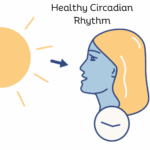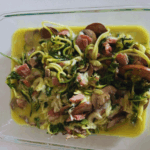Here is day four of the continuation of my journey backpacking the SHT.
As a person with Mast Cell Activation Syndrome (MCAS) I’ve taken up the challenge to backpack the 300-mile Superior Hiking Trail.
Table of Contents
What is MCAS?
Mast Cell Activation Syndrome (MCAS) is a chronic condition that affects all organ systems. MCAS is serious and disabling and people with MCAS experience often significant and debilitating symptoms daily, including anaphylaxis, which can be fatal.MCAS is often found in combination with other chronic conditions such as Ehlers-Danlos Syndrome (EDS) and Postural Orthostatic Tachycardia Syndrome (POTS). Frequently healthcare providers do not know about MCAS, and the tests for MCAS are problematic because they are not uniformly reliable. MCAS can be difficult to manage. Treatments include blocking mast cell mediators with anti-histamines and mast cell stabilizers, as well as avoiding triggers. Check out this post on how to manage MCAS.
Back on the trail!
I am back on the North Shore and starting on a 4-day backpack along the Superior Hiking Trail! I parked my car at the Pincushion Mountain trailhead and caught a ride to the Western end of the Lakewalk where I left off a couple of weeks ago. I filled up my water reservoir in Lake Superior and asked for a blessing from the mother lake for my walk.
Stepping onto the trail was a rude awakening. On my first step off the road, I needed to wade through a ten-foot expanse of mid-calf-deep muddy water. So much for dry shoes!
Rain, Rain, Rain
It was early afternoon and I knew from the weather forecast it was expected to rain around 3 p.m. I immediately heard thunder to the South as I hiked up, up, up the slope to the ridge. The thunder continued for an hour or so until it started raining.
On that first day’s walk, I only saw one other woman on the trail with her snarling dog. She had seen bear sign and was on edge, and her dog seemed stressed too. I stepped off the trail to let them pass and from then on I loudly called out my Qui Gong power phrase, “How La!” every ten seconds or so to alert any bears in the vicinity to my presence.
And downpour
I delayed donning my rain gear until the last second because it was so hot and muggy. But I was glad to have it as soon as the downpour started. I walked in the rain with my ultralight umbrella over my head for another hour until I reached my planned campsite at Crow Creek, around three miles in.
After I climbed the spur to the campsite I stood under a dripping tree for another 45 minutes while it continued to pour rain. Finally, I saw a little break in the weather and got my tent set up. It had rained so hard that everything in my backpack was damp despite my pack liner and umbrella. I have to admit it was pretty miserable, and I almost cried for a minute.
Reading to pass the time
I’d downloaded the book, “The Hobbit” to my books app on my phone, and commenced reading. I’d never read it before, and it was an engrossing and fun read; Baggins’ journey paralleling my adventure (minus the trolls and giants). And reading was a good way to pass a rainy evening.
Also, bugs
The forest was beautiful and peaceful despite the rain. The mosquitos, however, were insane. Many of them aggressively barged into the tent whenever I dashed in or out, and all night around one hundred of them were perched on the screendoor of my tent droning a constant buzz and watching me.
I was so glad to have my bug suit! It was an absolute lifesaver when I was on the trail. I’d accidentally made the mitts too small though, so they rested on my skin allowing the bugs easy access. I didn’t end up using them. My lightweight running mittens worked much better at deterring the bugs.
More wet
I’m thankful for a friend’s advice to pack extra socks, which felt heavenly at bedtime. It continued to rain all night so when I packed up my gear in the morning it was a sodden mess, and it was back to wet feet as soon as I put on my wet shoes.
The bucket theory
The bucket theory offers a helpful analogy for understanding symptom reactions with MCAS.
Think of your body as an empty bucket that you want to keep from overflowing. Different foods and activities fill your histamine bucket at different speeds but combine to form the total histamine level in your body (how full your bucket is). A fuller bucket means you have more histamine symptoms. When you manage triggers, reduce exposure to known triggers, and take medications and supplements to reduce histamine, you can manage the level of your bucket.
Know your typical symptom progression
Knowing your symptom progression in a symptom flare is the key to developing your rescue plan. In this post, I discuss how to determine your symptom progression. Once you know what typically happens in your symptom progression you can design a rescue plan to address those symptoms.
Get my free ebook, symptom log, and meal plan!
Want a tool to keep track of your symptoms easily? Sign up for my newsletter and you will receive my free 50-page ebook of lower-histamine, grain-free, sugar-free recipes, my free symptom log, and a free two-week meal plan!
Sign up for the SSP!
The SSP is a listening therapy based on Polyvagal Theory created by Stephen Porges to unlock your ability to think, feel, and connect better through nervous system regulation. You use the SSP via an app on your phone and listen with over-the-ear headphones to specially filtered music that heals the nervous system, specifically the vagus nerve. You subscribe to the app with a provider like me and listen to the specially curated music for 30 minutes each day for a 5-hour cycle. Studies show the SSP has a profound effect on mental health and chronic conditions
You can sign up for the SSP here!
Order my book!
Rocks and Roots chronicles my journey solo backpacking the Superior Hiking Trail and overcoming nervous system dysregulation, gut dysbiosis, and Mast Cell Activation Syndrome symptoms to hike 328 miles successfully.
Check out this powerful frequency device
Healy is an individualized microcurrent device I use to reduce inflammation. Check out this post for more about Healy.
Sign up for a session!
I provide one-on-one in-person and remote chronic illness and caregiver coaching and Sacred Self-Healing Sessions based on the Sacred Self-Healing Method, a proven novel co-creative healing modality detailed in my Books.
Click here for more information.
What do you think?
I’d love to have your reply below!
Disclaimer
The preceding material does not constitute medical advice. This information is for information purposes only and is not intended to be a substitute for professional medical advice, diagnosis, cure or treatment. Always seek advice from your medical doctor.


